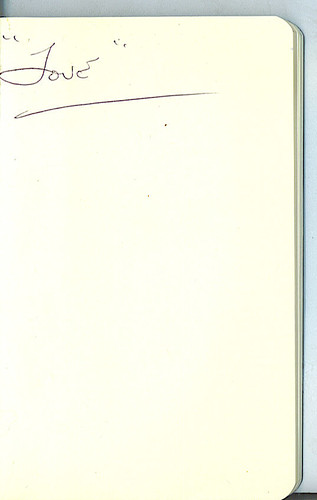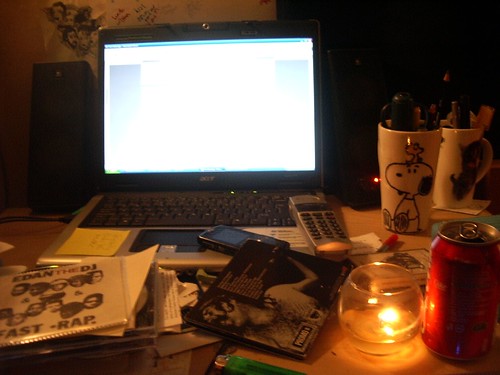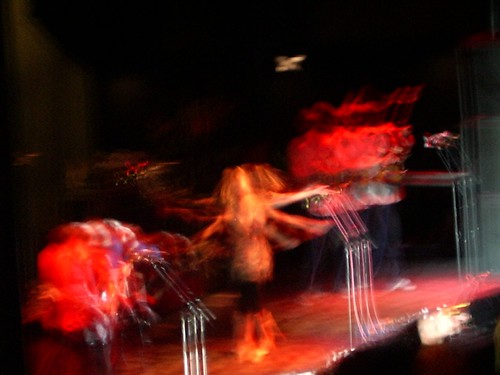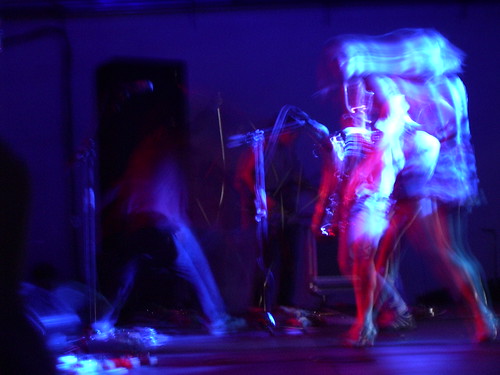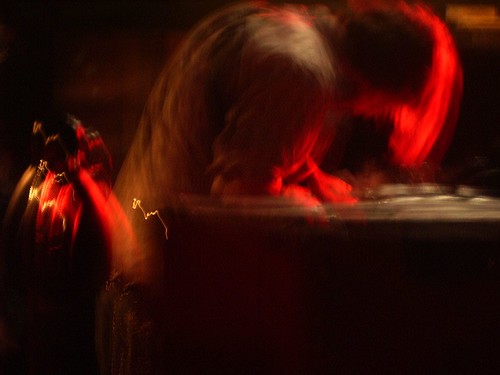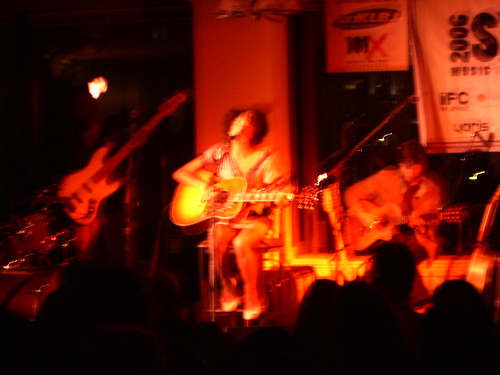[from Loose Lips Sink Ships, featuring amazing photography from
Steve Gullick. Scout has a new album out soon, and I've been feeling a little 'kidnapped by neptune' myself lately, so I thought I'd upload it.]
The drivers oozing down the dew-slicked blackness of the road stare incredulous through their windscreens, slowing down at the same spot as if on cue, rubbernecking like this were the scene of an accident. If you could see the traffic from the sky, the cars might almost resemble some multi-coloured, tin-plated worm inching slowly along the tarmac, bunching up somewhere near the middle.
On the shores of a concrete island, a girl holds her tiny frame aloft in a perfect handstand stance, concentration etched on her face, skin reddening, her sandy hair grazing the grimy pavement. Which would be remarkable in of itself (this being the dead of night, in the bleakest middle of winter, and not some gymnastics event), even if she weren’t wearing a luminous orange tabard (which she is) like a member of airport security gone astray, or a day-glo Hallowe’en skeleton costume (which she is) that makes her look like one of Kreese’s lackeys from The Karate Kid. As the cars pass silently their headlamp beams pick out the reflective material on her tabard and skeleton, so she glints and flashes and glows in the darkness.
Her name is Emma ‘Scout’ Niblett, and she does things other people mostly don’t, like singing songs accompanied only by her own drums, recording mournful covers of reggae classics, penning poems of encouragement to Charlie Brown’s insecure playmate Linus Van Pelt, and performing handstands while dressed like Bones from Superted round the back of a dingy North London pub.
The world being what it is, a number of these things Scout Niblett does tend to aggravate people no end. Internet message board I Love Music features a thread running to 125 replies (last count) rather hysterically titled ‘Scout Niblett: the *WORST MUSIC* in the WORLD..…’, where Emma is, in turn, labelled ‘grating’, ‘retarded’, a ‘shrill little harpee’ [sic], ‘twee to the max’, and a ‘prima arsehole’.
“There’s some people, I’m sure, that don’t get it,” she shrugs later, drawing concerned stares with her tabard and bones in the pub. “But the people who get it love it! It’s extreme… Some people just write me off, some people think the music’s brilliant. There’s no middle ground.”
Those in the market for pigeon-holing have earmarked her as mere post-Cat Power fallout, but that can’t be right, because I never loved Cat Power like I love Scout Niblett (and I love cats, ask anyone), and I never looked forward to Cat Power shows like I hunger for Scout Niblett shows (actually, I never looked forward to a Cat Power show, period, after my first, but that’s another story).
She started playing guitar when she was twenty-one, besotted with Nirvana. “To me, the beauty of Kurt’s songs were that they seemed so easy to play. They were so simple, but so powerful. When I picked up the guitar, I just knew I needed to do it.”
The first song she ever played was The Pixies’ ‘Gigantic’, picking the bassline out by ear on a single guitar string. At university, she played in a group called Novachichi with Akiko, singing drummer for the awesome Comanechi and Pre, and studied music, art and performance. Regular live performance being a key part of her course, she played gigs when she could, performing at local Open Mic nights in Nottingham. “And I’m really grateful for that,” she remembers, “because being forced to do it was so good for me. I’m quite shy. I knew I’d die if I didn’t get into it, that I’d die of shyness onstage [giggles], so I threw myself into it, and got really obsessed.”
She’d been dabbling with the drums since 1997, but a fellow regular at the Open Mic nights sold her on the instrument. “He was this old man, he would play calyspo songs on the guitar. He’d been in the military when he was young, so if ever there was a drum kit around, he’d sit behind it and start playing the snare drum, singing Beatles songs. He used to play ‘8 days A Week’ And I thought it was the most amazing thing I’d ever seen, and I wanted to do it.”
Some memories of Scout: her walking through the audience, singing like a proud missionary, as Brother Daniel strummed twisted hymnals dressed like a muppet fruit tree; raging excited in the Buffalo Bar, planning a cover of Thin Lizzy’s ‘Jailbreak’ with similarly elemental grungers Winnebago Deal; close to tears one afternoon because her drum-kit has gone AWOL; glorious that evening, backed by her drummer Jason Kourkounis (formerly of Mule, Delta 72, Hot Snakes, Beehive & The Barracudas and Burning Brides), sorting through the heavy girders and sore splinters of her new album, Kidnapped By Neptune, to deliver something raw and richly melodic, vulnerable and empowered, something several leagues more starkly beautiful than her music’s cathartic origins might suggest; the day I realised that wig Emma used to wear all the time was actually a wig…
“I don’t really wear the wig anymore,” says Emma, of the ash-blonde mane she used to sport onstage, which so altered her appearance I thought she wore it to shake besotted stalker fans after the show (inna ‘Scout Niblett has left the building!’ stylee). “It’s kind of been replaced by this orange thing [indicates tabard]. It’s almost shamanistic, that the clothes you wear give you power within yourself. For me, it’s definitely about empowering myself through what these clothes do for me.
“It’s not that they create a different persona… It’s not me wearing just any wig, it’s that particular wig, or that look… Like, with the orange jacket, it made me feel safe the minute I put it on. I know that sounds stupid, but I actually do get really strong feelings off certain clothes. And that’s why I don’t have many clothes, I get really obsessed with the clothes I’ve had for years, because I feel like they allow me to be myself. It’s not like I wear them trying to be someone else, they actually bring out that part of my self.
“It’s like with music,” she continues. “I love music. It’s the only thing that really makes me feel… I used to play piano when I was little, making up songs. I’ve just got a real need to express myself, and music’s the thing that I love most. I didn’t feel I had a choice about it, I just needed to do it.”
The first Scout Niblett song I ever heard and loved was ‘Gymnastic (Fall Over)’. Those crashing drums hit like amphetamine, blood-racing, dizzying. And her voice, unaccompanied, yelling and yowling, “Let’s go! Let’s go!”, all desperate, excited, like you could hear blood-vessels breaking in her throat: this incessant and insistent sense of urgency, forcing these words out of her at such a velocity and volume… An energy that was utterly contagious.
The second Scout Niblett song I ever heard and loved (and this one sealed the deal) was her titular blues for Linus Van Pelt, Emma playing cheerleader for that wonderfully odd and terminally insecure boy from Charles M Schulz’s Peanuts cartoons, the one who believes in the Great Pumpkin, and can recite whole chunks of the bible from memory, and who looked like an owl when he wore glasses to correct his lazy eye (and that made his sister Lucy cry, but don’t tell anyone or she’ll pound you), and who drags that dang security blanket with him everywhere he goes. I haven’t met a girl yet who wasn’t a little in love with Linus.
“I’ll draw inspiration from anything,” she grins, “Something will pop into my head and have me intrigued, curious, thoughtful enough to write a song. With ‘Linus’, I just got thinking about the whole thing with his security blanket. I wanted to tell him, ‘you don’t need it!’”
Do you have a ‘security blanket’ of your own?
“I don’t know. I guess, like I was saying earlier, my clothes. The tabard.”
But you draw strength from your tabard… Maybe you should let Linus alone, let him keep his security blanket?
“Yeah, maybe,” she muses thoughtfully, before stopping herself. She wrinkles her nose and giggles. “I love that we’re discussing Linus Van Pelt like he were a ‘real’ person!”
The strip’s almost-fifty year lifespan gave Schulz the time to invest these little kids’ unnaturally-extended adolescences with enough anxiety, whimsy, weird detail and emotional depth as to make them seem real. A very adult angst pervades Peanuts; it’s evocation of childhood is so realistic, so telling, because the strip takes a child’s perspective. Adults are always telling kids that childhood is the best time of their lives, free of the responsibilities of adulthood. But, trapped within their own dramas, and lacking the maturity or experience to put their anxieties into perspective, the trials of childhood - insecurity, humiliation, struggle, loneliness - seem very real and insurmountable to the children living it. Fear is a constant theme, emotional isolation another, as these children try and adapt to the very adult complexities of their lives.
It’s not hard to imagine the elfin Emma, dressed up in her tabard and skeleton costume, telling Linus about astrology as she takes the boy from the pumpkin patch to go trick-or-treating. Peanuts and Kidnapped By Venus, Scout Niblett’s third album, share a similarly anxious mindspace.
Self, or the sense of ‘self’, or the periodic loss of that sense of ‘self’ (and how that’s scary, and dangerous, and exciting, and healthy, and entirely natural, and perhaps the work of mysterious celestial forces) is a central theme of Kidnapped By Neptune. The sleeve artwork is mostly black, printed on card not unlike the paper you’re currently reading, sucking in light and reflecting none back (even the CD tray is cast in black plastic). There are only two photographs: the first, on the cover, is a blurred shot of Scout walking, back to the camera, into blackness, the reflector strips on her orange tabard flaring wildly. In the second photograph, the CD inlay’s centre spread, freezing waves erupt in frothy grey and white from the darkness. A closer stare into these choppy waters finds Emma drowning, not waving, her blonde hair lank and sodden and masking her eyes, willing herself softly swallowed by the waves.
The title is a reference to the several years Emma has spent with the Roman God of the sea fucking up her astrological shit. “Neptune’s been really strong in my chart,” she explains, “and the whole thing about Neptune is you lose control of who you are. That can be a bit demoralising. But at the same time, it’s a good thing; you’re able to see yourself in a less-fixed way. But it’s quite scary...
“Because I do astrology, I’ve been able to see what’s been happening… Neptune just affects everything, it makes everything foggy. My whole experience’s been not very solid, it’s been up in the air since Neptune came in the frame. It’s been there for two years; it’s always moving, but because the constellation passes so slowly, when it enters your chart, you’ll feel that for a long time.”
Emma’s dad bought her a book about astrology when she was six, which she would pore over for hours, researching her sun sign. As she grew older, she got deeper into the subject, composing her own charts by the time she was nineteen.
“I can do charts for other people, too, people ask me to write their charts all the time…” she smiles proudly. “It’s mostly maths, initially, because you have to calculate things. The art of it is trying to interpret what all that data means, what’s indicated by the pattern of the stars on the day you were born. And that’s just a matter of sitting down for hours and writing it all down.
“When someone does your first chart reading on your personality, it’s just astonishing. And it feels so true, what it says about you just hits home. And then, through experiencing things over the years, you can see astrology working in front of your eyes, all the time. Astrology can help you be dynamic with what’s going on, instead of just being a victim of it. It’s empowering.”
Neptune’s disruptive influence, she says, anticipated several years of personal upheaval; her charts didn’t predict exactly what challenges and misfortunes would beset her, but the knowledge that she would be enduring some choppy emotional waters at least reassured her that she wasn’t losing her mind, that this was just a necessary period of astrological unrest that would surely be followed, at some later date, by calmer seas.
So she endured the insecurity and displacement of pursuing her art, travelling the world, relocating to America, finding kindred spirits in Danielson Famile, in Jason Molina and his country rock renaissance friends, in Swearing At Motorists and in Steve Albini, who records her at his Electric Audio studios in Chicago, his tight-focus, no-Vaseline-on-the-lens technique serving her sparse and brutal blues to the ground, capturing every gutteral growl, every sly lick, ever tender moan. She broke a few hearts, took a couple of lumps of her own, let her self melt a little with someone else’s, and when that didn’t work out spent some time licking her wounds, pulling herself back together again, and working out just exactly who that self was.
Sometimes, in a relationship, the line between yourself and your partner becomes blurred, and you find your own essential make-up somehow altered by this other person, what they mean to you, what they do to you, how they make you feel. And then, one day, they aren’t there anymore, and at first all you feel is the shock of that loss, that absence. But then you start to recover, and have to begin the painful process of working out just who you are again, when you aren’t a part of someone else, and which of these many component parts is really you anyway, and which of them you want to remain.
Which is where Kidnapped By Neptune comes in. Loss, absence, longing and displacement are all constants here, a sequence of songs mood-swinging between anguished melancholy and a desperate sense of self-assertion. It essays this period of ‘losing control of who you are’, as Scout’s world is scattered to the winds, and she sorts through the debris, trying to make sense of it all. Like the stars that make up a constellation were suddenly thrown out of their orbits, and struggled to pull themselves back into order.
It opens with ‘Hot To Death’, all swooning guitars and heavenly croons, a junk-sickly Breeders lullaby, slipping sharply into the cold, sobering nightmare of ‘Kidnapped By Neptune’. Fogged with the chilling gloom of ‘Moody’-era ESG, finding a funk similar to Free Kitten’s mantric ‘Never Gonna Sleep’, it’s a maddeningly-hooked breakdown, or maybe a ‘coming-to’, a bid hello to a self forgotten. Over a martial stomping drum break, an urgently pinging bassline, ‘shoop shoop shoop’ coos come on like The Flamingoes’ deliciously eerie ‘I Only Have Eyes For You’ set to a motorik beat. Then, a slaloming low pulse sweep, a repeated refrain of “Where’ve you been? Where-where’ve you been?” melting into an ecstatic, yawning “Yooooouuu craaaaaaaaazy giiiiiiiirl!”. Repeat twice and finish; you cannot imagine how fantastic it sounds.
“I’d had that drum piece, the ‘barumdum tish’, in the back of my mind for ages,” Emma grins. “I started playing it… It was a drum song really. It felt good to be so sparse, strip everything down to the element. I hummed the melody into my computer.”
‘Kidnapped By Venus’ is a certain kind of break-up song, greeting the person she was before the love she just lost, a cautious welcome like you might offer to a dear but errant friend who always drags you into their wild and chaotic turmoil when they come around (not that you don’t love every minute of it). Retelling Little Red Riding Hood, with Scout as both predator and prey, it gives way to the funereal, wallowing ‘Pom Poms’, Scout slumped in her own little corner, unloved, murmuring “Everyone needs a cute girl with pom-poms to spell out their name in song”. Skip forward to ‘Valvoline’, those rasping, rigid traps slamming petulantly, Scout shouting, “I am the driver! I am the driver! I am the driver!” And while she’s logged plenty hours behind the wheel of the tourbus, this is not just a song of motoring primacy.
“It meant two things,” she smiles. “It was definitely about driving, but the main thing it was about for me was saying, I’m driving myself, I’m doing this. Yeah. If that makes sense. Reclaiming my self, I guess.”
‘Wolfie’ is breath-taking, Scout picking out a Crazy Horse blues, mourning a dying love and dreaming what could have been. “My hand held yours, and who was prouder to be with the other?” she asks in hazy remembrance, the waning melody telling a more uneasy story. “I think it was me,” she answers, sadness creeping in. The tempo slows, becomes hypnotically erratic, melting into a wounded strum, roaring into volume then recoiling penitently, as she sloughs into a sentiment that stings, a painful desire. Her face pressed against the railings, yearning for what cannot be, she sings darkly, “In the end, I would have loved you forever. I know it to be true, because though we’re not together, love is never through.” She sounds utterly bereft, like she knows this will never heal.
“Periods of emotional instability are when I do my best writing,” she says. “Like, when I’m feeling really alright and happy, I don’t really feel as much need to write a song. I’m just someone who has extreme emotions, it’s not like I’m always ‘sad’ or I’m always ‘happy’, and I know that’s not going to change, so I know I’m always going to need to write songs. And some of the songs are celebratory, it’s not like I can’t write when I’m feeling good. But it’s a different kind of energy. It feels good to get stuff down on paper.”
There’s an old Paul Simon lyric lodged in my head, about heartbreak leaving you open, “So everybody sees you’re blown apart, everybody feels the wind blow”. And there’s a lot of debris being cleared up across these tracks, a lot of very raw feelings being worked out.
“A lot of what I sing about, I don’t really know what it is I’m singing about until it’s done. I never sit down and think, ‘I’m gonna write a song about this’. It’s like my subconscious is trying to get some message to me, through my lyrics. Music’s helped me find myself, and define myself; it’s always really cathartic for me. And it’s helped these last few years, when I’ve been ‘Kidnapped by Neptune’.”
Most striking of Kidnapped By Neptune’s songs is the haunting, electrifying ‘Lullaby For Scout In 10 Years’. A song penned for whoever Emma will be in a decade’s time, it verbalises the fears and anxieties soothed by the Doris Day Easy Listening favourite ‘Que Cera Cera’ (check Sly & The Family Stone’s Stand LP for a soul-slaying take on this old standard), Emma asking herself “Is there someone to hold you tightly in their arms?” over tentative, twisted strings. “If there’s no-one, then drink a glass with me,” she reassures herself, before yelling, over the kind of splintering, charred guitars Kurt Cobain struck on In Utero, “Honey, If you’re still around”. It’s such a startling line, not least for that opening “Honey,” sung like this Emma-from-the-present might be the only friend Emma-of-the-future has (or maybe the only constant from this moment to that), but mostly for even questioning that she might see out another decade.
“I do think about it, yeah, what I‘ll be like in ten years’ time,” she laughs, “But I have no idea what I’ll be like. The whole point of that song, to me, is if I’ll still be around. Because I don’t even know if I’ll even be alive or not. Not for any specific reason, just because we don’t know.
“I think it’s interesting to think ahead ten years,” she continues. “Even though we all know we’re going to die eventually, we tend to have this feeling that we’re going to be around until we’re at least 65, 70. But I think it’s good to question that, to question whether you’ll still be here in ten years’ time - I say ten years, but I could’ve written a week. I think it stops you taking everything quite so for granted.”
In the ten years since you started learning to play guitar, you’ve made records, travelled the world playing music, relocated to America, collaborated with wonderful musicians… Could you have predicted any of this then?
“No! It’s amazing to me, it’s the best thing... And it’s funny, considering I’m so obsessed with astrology and predicting the future… The paradox is, I love the fact that I can’t really predict what’s going to happen.”
What if someone came into the bar tonight and said they could tell you what the Scout of ten years’ time would be like, where you’ll be in a decade?
“I wouldn’t want to know. [pause] Well, I would want to know, but I know it would be bad for me to know. Because if you know what’s going to happen in the future, you’ll just give up on the present.”
She’s doing better now, is Emma, better than when she wrote and recorded this album anyway. Neptune is making his slow exit, and she’s making some kind of sense of what’s left, after his disruptive visitation.
“I’m very independent,” she asserts. “I think I’m like that because I do have a strong sense of who I am, even though I have periods when it feels difficult, and I feel wobbly, trembly. But underneath, there’s something I’ve got… That I know… I don’t know how to describe it…”
A sense of self?
“Yeah. Maybe that’s strange.”
Not really. You’re sure of yourself, because you know how it feels to be at odds with yourself. How can you know who you really are, what you can achieve and withstand, if you don’t challenge yourself?
She nods. “It’s those times when things are difficult, when you learn who you really are.”
(c) Stevie Chick, 2005
